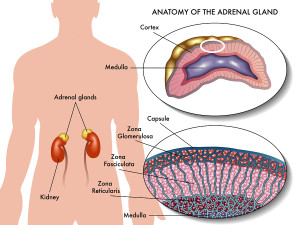Introduction
Adrenal gland hormones are produced by the adrenal glands. They produce four major hormones. In the outer regions (the cortex) they produce the hormones cortisol and aldosterone as shown on this link.In the central part of the adrenal glands the catecholamines are produced. Catecholamines are a mix of epinephrine (also known under the name “adrenaline”) and norepinephrine. The most important of these catecholamines in the adrenal glands is epinephrine. The glucocorticoids are produced in the zona fasciculata of the adrenal gland (about 10 to 20 mg per day, mainly cortisol) under the control of ACTH. Aldosterone is produced by the zona glomerulosa at a much lower rate of 100 to 150 micro-grams/day. Angiotensin II is the principal control for aldosterone. DHEA is the fourth hormone of the adrenal glands and is the main adrenal androgen produced in the zona reticularis. It is secreted at a rate of more than 20 mg per day (Ref. 16). DHEA is sulfated in the zona reticularis by the enzyme DHEA sulfotransferase and stored as DHEAS.
Below is a summary of the various common disorders associated with over- and underproduction of the adrenal gland hormones. This will be explained in more detail under the links. The most common condition that affects people under chronic stress is adrenal fatigue (Ref. 18).
There are circadian rhythms of hormone production throughout the day. Hormones are metabolized out of precursor hormonal compounds and can be converted into other hormones. For instance, DHEA can be converted into estrogens (estradiol, estrone and estriol) and into testosterone (Ref. 17).
Adrenal Gland Disorders
Overproduction of …cortisol : Cushing’s syndrome , …aldosterone : Conn’s syndrome , …epinephrine : Pheochromocytoma
Underproduction: Adrenal Fatigue (partial underproduction), Addison’s disease (adrenal gland insufficiency, rarely with large tumor mass in adrenal glands)
References
1. B. Sears: “The age-free zone”. Regan Books, Harper Collins, 2000.
2. R.A. Vogel: Clin Cardiol 20(1997): 426-432.
3. The Merck Manual, 7th edition, by M. H. Beers et al., Whitehouse Station, N.J., 1999. Chapter 8: Thyroid disorders.
4. The Merck Manual, 7th edition, by M. H. Beers et al., Whitehouse Station, N.J., 1999. Chapter 7:Pituitary disorders.
5. J Levron et al.: Fertil Steril 2000 Nov;74(5):925-929.
6. AJ Patwardhan et. al.: Neurology 2000 Jun 27;54(12):2218-2223.
7. ME Flett et al.: Br J Surg 1999 Oct;86(10):1280-1283.
8. The Merck Manual, 7th edition, by M. H. Beers et al., Whitehouse Station, N.J., 1999. Chapter 261: Congenital anomalies.
9. AC Hackney : Curr Pharm Des 2001 Mar;7(4):261-273.
10. JA Tash et al. : Urology 2000 Oct 1;56(4):669.
11. D Prandstraller et al.: Pediatr Cardiol 1999 Mar-Apr;20(2):108-112.
12. B. Sears: “Zone perfect meals in minutes”. Regan Books, Harper Collins, 1997.
13. J Bain: Can Fam Physician 2001 Jan;47:91-97.
14. Ferri: Ferri’s Clinical Advisor: Instant Diagnosis and Treatment, 2004 ed., Copyright © 2004 Mosby, Inc.
15. Rakel: Conn’s Current Therapy 2004, 56th ed., Copyright © 2004 Elsevier
16. Kronenberg: Williams Textbook of Endocrinology, 11th ed., © 2008 Saunders, An Imprint of Elsevier
17. George Gillson, MD, PhD and Tracy Marsden, BScPharm: “You’ve hit menopause, now what?” (3 simple steps to restoring hormone balance); Rocky Mountain Analytical Corp., 2nd edition, 2004, Canada
18. James L. Wilson, ND, DC, PhD: “Adrenal Fatigue, the 21sty Century Stress Syndrome – what is it and how you can recover”;
Second printing 2002, by Smart Publications.com







